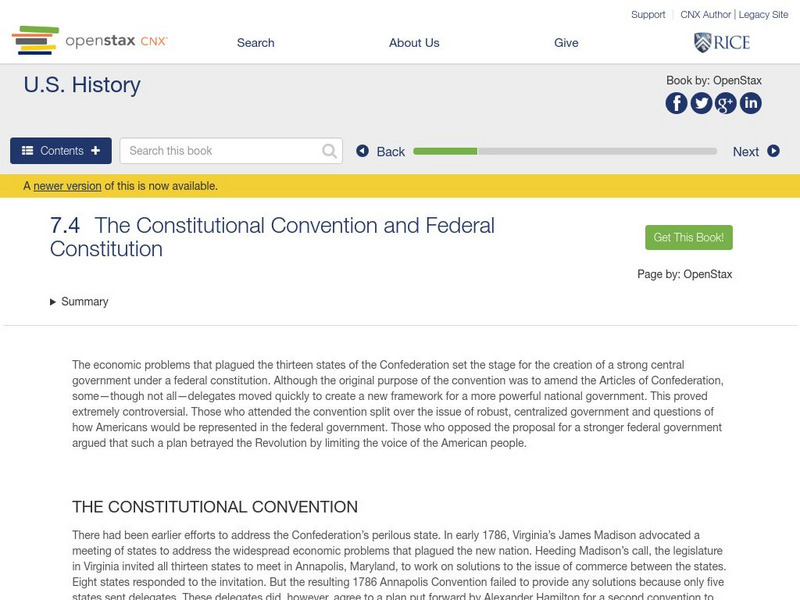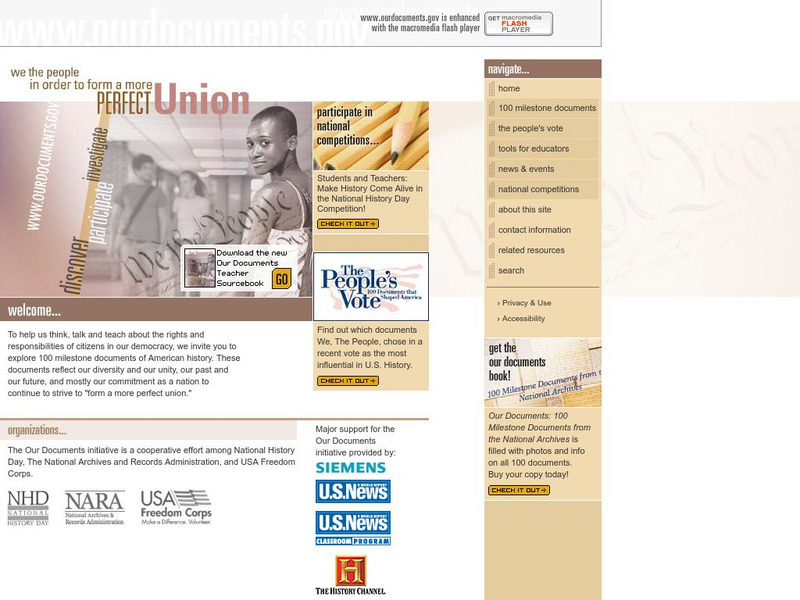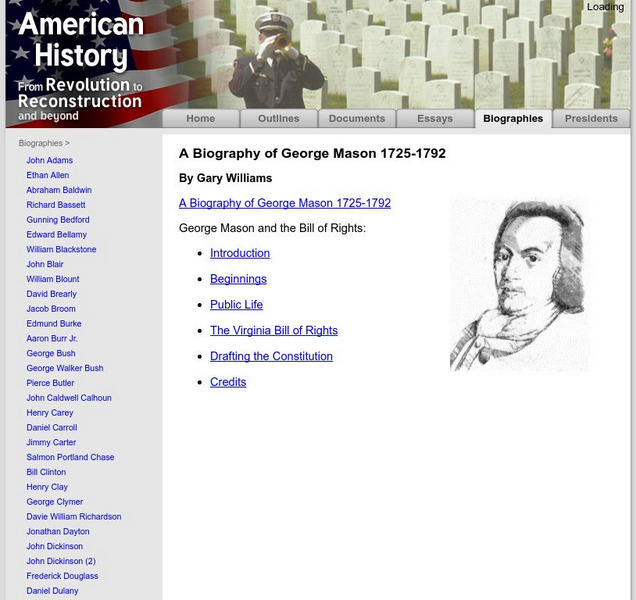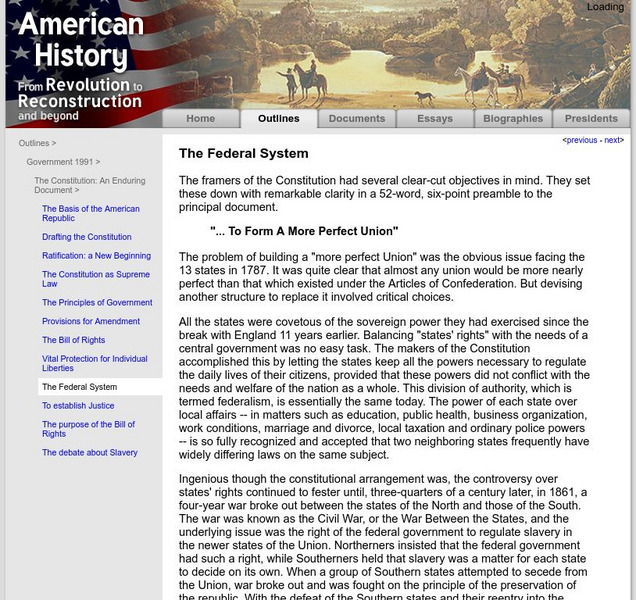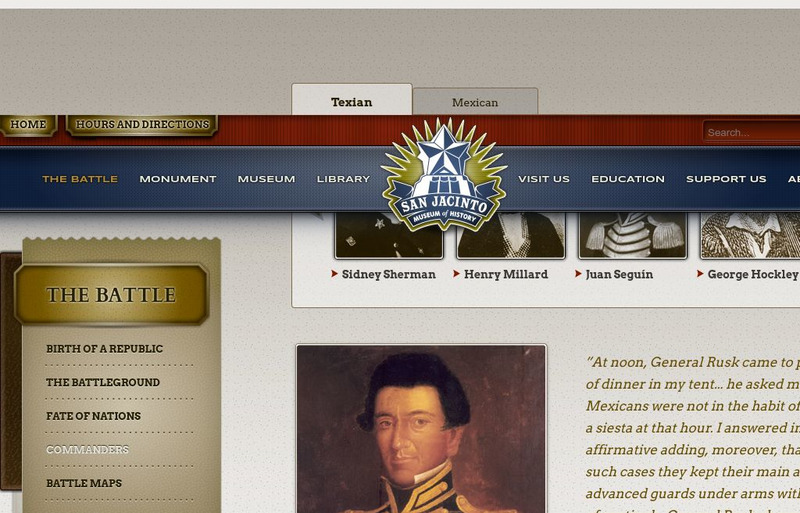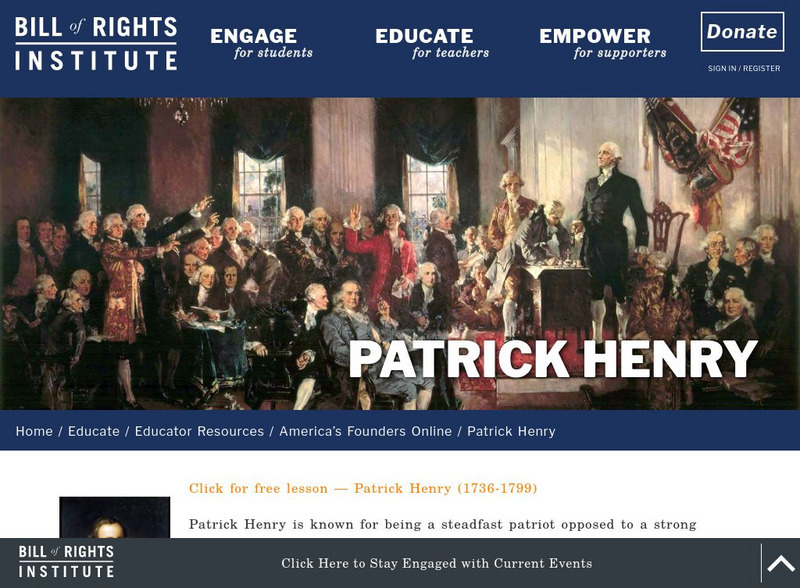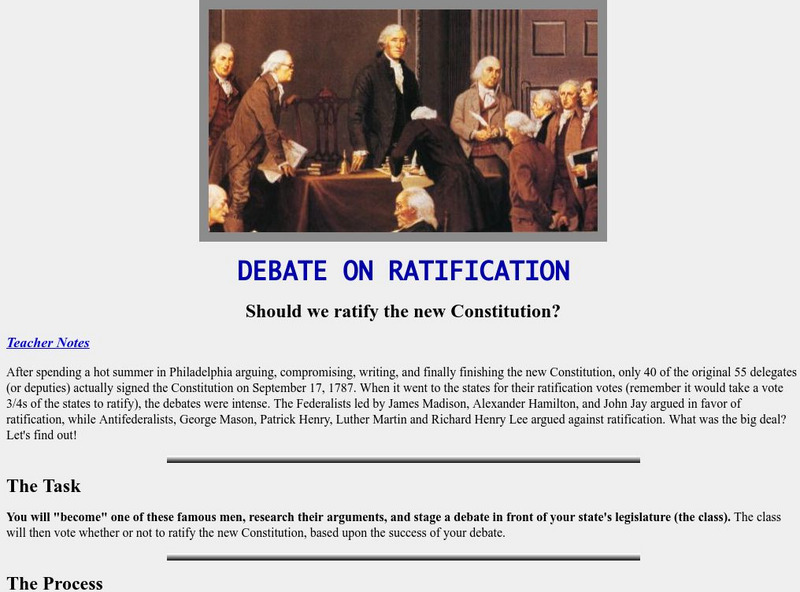Hi, what do you want to do?
OpenStax
Open Stax: The Constitutional Convention and Federal Constitution
After reading this section of the chapter on "Creating Republican Governments", students will be able to identify the central issues of the 1787 Constitutional Convention and their solutions and also describe the conflicts over the...
iCivics
I Civics: You've Got Rights!
Students learn about the rights guaranteed by the Bill of Rights and other important constitutional amendments.
US National Archives
Our Documents: A National Initiative on American History, Civics, and Service
Our Documents is home to one hundred milestone documents that influenced that course of American history and American democracy. Includes full-page scans of each document, transcriptions, background information on their significance, and...
University of Virginia
Miller Center at Uva: u.s. Presidents: John Adams: A Life in Brief
A good look at John Adams as president and the struggles he had both domestically and in foreign affairs. Read about how he kept America out of war and his political isolation because of his hard-held beliefs.
Khan Academy
Khan Academy: Brutus No. 1
This resource from Khan Academy provides the full text of Brutus I. This lesson is intended for students taking high school or college level American Government and Civics courses, including the AP Government course.
Bill of Rights Institute
Bill of Rights Institute: Constitution of the United States of America (1787)
The Constitution was written in the summer of 1787 in Philadelphia, Pennsylvania, by delegates from 12 states, in order to replace the Articles of Confederation with a new form of government. It created a federal system with a national...
iCivics
I Civics: No Bill of Rights, No Deal
In the debate over the Constitution, the Bill of Rights was a deal-breaker. In this lesson, students learn why the federalists thought the Constitution didn't need a bill of rights and why the anti-federalists refused to accept the...
Digital History
Digital History: Ratifying the Constitution
After the Constitution was written, debated, and finally adopted by the Constitutional Convention, it was sent to the states to ratify. Read about the fears of those who did not want to ratify it and see how their fears were addressed.
Wikimedia
Wikipedia: United States Bill of Rights
This encyclopedia article from Wikipedia gives some background history to the creation of the Bill of Rights and contains a transcription of the first ten amendments to the Constitution in their original form.
US Government Publishing Office
Ben's Guide to u.s. Government: Federal Versus State Government
Learning Adventure teaches about the differences between federal and state governments as written in the Constitution and shares reasons the founding fathers wanted it this way.
Alabama Learning Exchange
Alex: Constitution or Articles?
In this lesson, students will observe the political climate at the time of the Constitutional Convention of 1787, and read the writings of the delegates who refused to sign the proposed Constitution, as well as those who supported it....
University of Groningen
American History: Biographies: George Mason 1725 1792
This resource presents links for different parts of George Mason's life. Information about his life includes links to relevant topics.
Digital History
Digital History: The Founding Fathers' Motives [Pdf]
Read some historians' views about the Founding Fathers and their interests, perhaps economic, in writing the Constitution. Historians' views have changed over time, and in the suggested student exercises, students are asked to assess...
Digital History
Digital History: Sedition Act and the Virginia and Kentucky Resolutions [Pdf]
Read about the foreign policy problems the United States was having at the beginning of the Adams administration. See what led up the the passage of the Sedition Act and some ramifications of it, and the Kentucky and Virginia Resolutions...
University of Groningen
American History: Outlines: The Federal System
Outline of the principles embedded in a Federal System of government attempting to balance states' rights with the need for a central government.
Scholastic
Scholastic: Explaining the Bill of Rights
Read about the need for a Bill of Rights to be added to the Constitution. Find out what each of the first ten amendments means.
Michigan State University
Michigan State University: American Revolution: The Argument Over the Constitution
The National Humanities Center provides a full-length essay on the constitutional debate during the time of the Constitutional Convention.
Annenberg Foundation
Annenberg Classroom: The Bill of Rights Interactive Quiz
Many Americans take for granted the freedoms contained in the first 10 amendments to the Constitution. As students play this game, they will discover surprising facts about the story behind the Bill of Rights and gain a clearer...
Khan Academy
Khan Academy: The Election of 1800
This Khan Academy resource provides and overview of the issues surrounding the Election of 1800.
University of Chicago
The Founders' Constitution: Luther Martin: Genuine Information
A speech given by Luther Martin, the delegate from Maryland to the Constitutional Convention. Martin was a believer is state's rights and did not sign the finished document.
Wikimedia
Wikipedia: Luther Martin
Describes the life of Luther Martin, a delegate to the Constitutional Convention from Maryland. He did not sign the Constitution, and he later served for many years as the Attorney General of Maryland.
San Jacinto Museum of History
San Jacinto Museum: Commanders in the Field: Juan Seguin
From this San Jacinto Museum article you can read about Juan Seguin, a man who loved Texas, fought well in the Battle of San Jacinto, but was sent to Mexico because of discrimination.
Bill of Rights Institute
Bill of Rights Institute: Patrick Henry
Patrick Henry is known for being a steadfast patriot opposed to a strong centralized government. In 1765, Henry was elected to the Virginia House of Burgesses. By the 1770s, Henry had emerged as one of the most radical leaders of the...
Schools of California Online Resources for Education
Score: Debate on Ratification
Students become one of the famous men who argued for or against ratification of the Constitution. They research and present their argumets to the class, who will then vote whether or not to ratify the new Constitution.





